Agency Law: Relationships, Authority, and Liabilities
VerifiedAdded on 2020/01/15
|10
|3919
|256
Report
AI Summary
This report provides a comprehensive overview of agency law, a crucial part of commercial law. It examines the relationships between principals, agents, and third parties, highlighting the legal implications of these interactions. The report defines agency, using case law to illustrate concepts such as express and implied agreements, and apparent authority. It explores the liabilities of agents and principals, detailing the duties each owes to the other, and the various types of agents, including universal, general, and special agents. The report also covers how agency relationships are formed, including by agreement, ratification, estoppel, and necessity, providing real-world examples to clarify these complex legal principles. It also provides the different types of agents with examples.
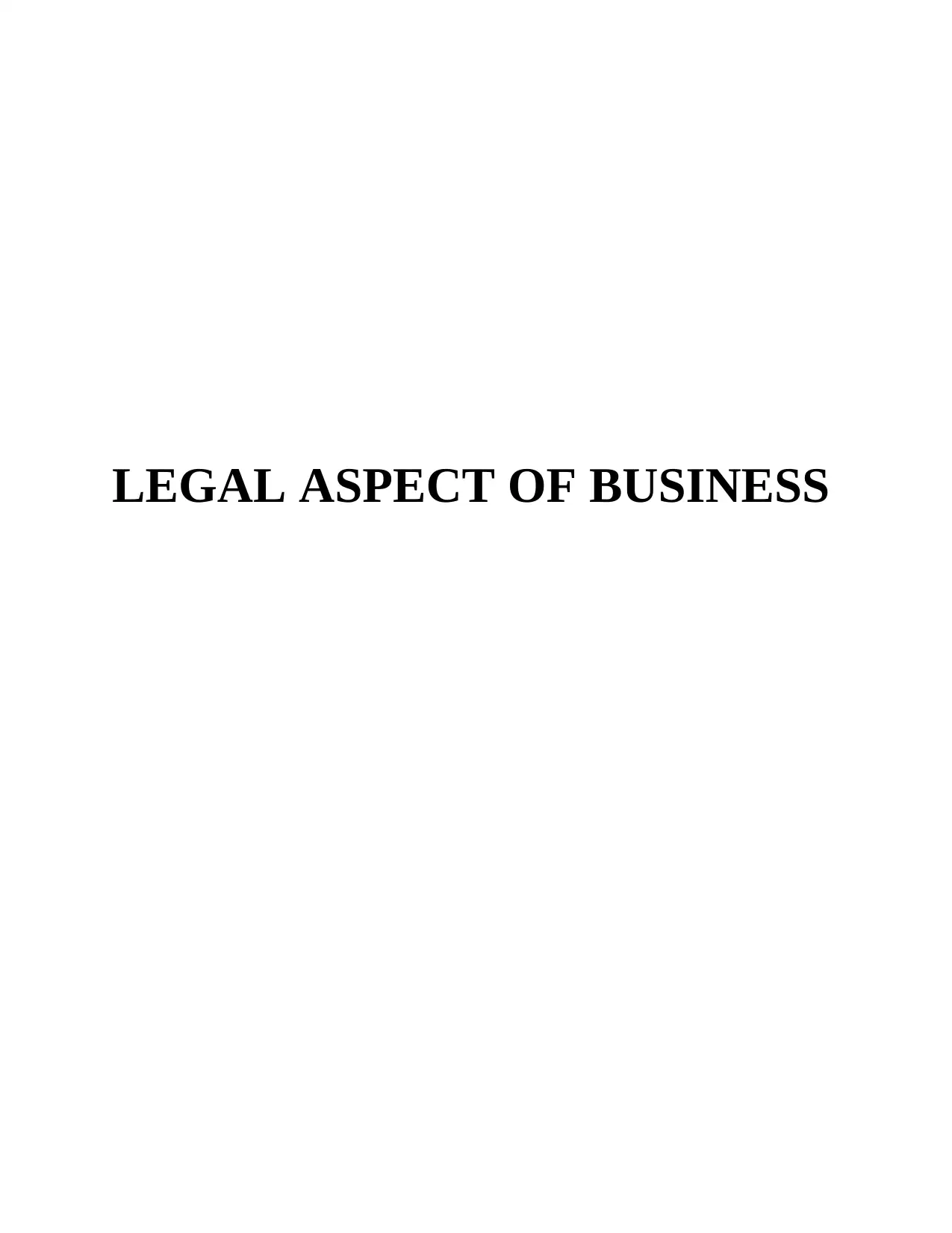
LEGAL ASPECT OF BUSINESS
Paraphrase This Document
Need a fresh take? Get an instant paraphrase of this document with our AI Paraphraser
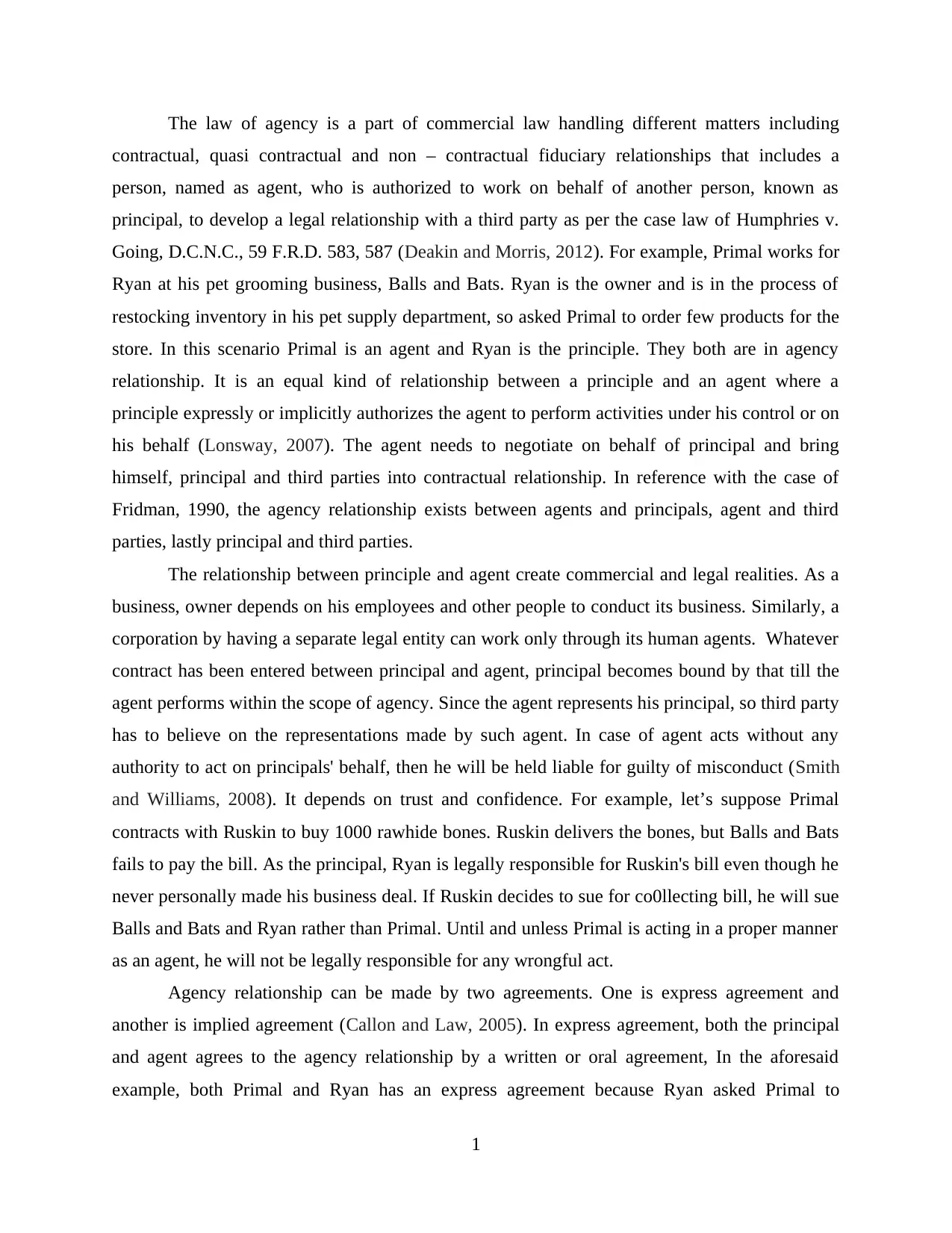
The law of agency is a part of commercial law handling different matters including
contractual, quasi contractual and non – contractual fiduciary relationships that includes a
person, named as agent, who is authorized to work on behalf of another person, known as
principal, to develop a legal relationship with a third party as per the case law of Humphries v.
Going, D.C.N.C., 59 F.R.D. 583, 587 (Deakin and Morris, 2012). For example, Primal works for
Ryan at his pet grooming business, Balls and Bats. Ryan is the owner and is in the process of
restocking inventory in his pet supply department, so asked Primal to order few products for the
store. In this scenario Primal is an agent and Ryan is the principle. They both are in agency
relationship. It is an equal kind of relationship between a principle and an agent where a
principle expressly or implicitly authorizes the agent to perform activities under his control or on
his behalf (Lonsway, 2007). The agent needs to negotiate on behalf of principal and bring
himself, principal and third parties into contractual relationship. In reference with the case of
Fridman, 1990, the agency relationship exists between agents and principals, agent and third
parties, lastly principal and third parties.
The relationship between principle and agent create commercial and legal realities. As a
business, owner depends on his employees and other people to conduct its business. Similarly, a
corporation by having a separate legal entity can work only through its human agents. Whatever
contract has been entered between principal and agent, principal becomes bound by that till the
agent performs within the scope of agency. Since the agent represents his principal, so third party
has to believe on the representations made by such agent. In case of agent acts without any
authority to act on principals' behalf, then he will be held liable for guilty of misconduct (Smith
and Williams, 2008). It depends on trust and confidence. For example, let’s suppose Primal
contracts with Ruskin to buy 1000 rawhide bones. Ruskin delivers the bones, but Balls and Bats
fails to pay the bill. As the principal, Ryan is legally responsible for Ruskin's bill even though he
never personally made his business deal. If Ruskin decides to sue for co0llecting bill, he will sue
Balls and Bats and Ryan rather than Primal. Until and unless Primal is acting in a proper manner
as an agent, he will not be legally responsible for any wrongful act.
Agency relationship can be made by two agreements. One is express agreement and
another is implied agreement (Callon and Law, 2005). In express agreement, both the principal
and agent agrees to the agency relationship by a written or oral agreement, In the aforesaid
example, both Primal and Ryan has an express agreement because Ryan asked Primal to
1
contractual, quasi contractual and non – contractual fiduciary relationships that includes a
person, named as agent, who is authorized to work on behalf of another person, known as
principal, to develop a legal relationship with a third party as per the case law of Humphries v.
Going, D.C.N.C., 59 F.R.D. 583, 587 (Deakin and Morris, 2012). For example, Primal works for
Ryan at his pet grooming business, Balls and Bats. Ryan is the owner and is in the process of
restocking inventory in his pet supply department, so asked Primal to order few products for the
store. In this scenario Primal is an agent and Ryan is the principle. They both are in agency
relationship. It is an equal kind of relationship between a principle and an agent where a
principle expressly or implicitly authorizes the agent to perform activities under his control or on
his behalf (Lonsway, 2007). The agent needs to negotiate on behalf of principal and bring
himself, principal and third parties into contractual relationship. In reference with the case of
Fridman, 1990, the agency relationship exists between agents and principals, agent and third
parties, lastly principal and third parties.
The relationship between principle and agent create commercial and legal realities. As a
business, owner depends on his employees and other people to conduct its business. Similarly, a
corporation by having a separate legal entity can work only through its human agents. Whatever
contract has been entered between principal and agent, principal becomes bound by that till the
agent performs within the scope of agency. Since the agent represents his principal, so third party
has to believe on the representations made by such agent. In case of agent acts without any
authority to act on principals' behalf, then he will be held liable for guilty of misconduct (Smith
and Williams, 2008). It depends on trust and confidence. For example, let’s suppose Primal
contracts with Ruskin to buy 1000 rawhide bones. Ruskin delivers the bones, but Balls and Bats
fails to pay the bill. As the principal, Ryan is legally responsible for Ruskin's bill even though he
never personally made his business deal. If Ruskin decides to sue for co0llecting bill, he will sue
Balls and Bats and Ryan rather than Primal. Until and unless Primal is acting in a proper manner
as an agent, he will not be legally responsible for any wrongful act.
Agency relationship can be made by two agreements. One is express agreement and
another is implied agreement (Callon and Law, 2005). In express agreement, both the principal
and agent agrees to the agency relationship by a written or oral agreement, In the aforesaid
example, both Primal and Ryan has an express agreement because Ryan asked Primal to
1
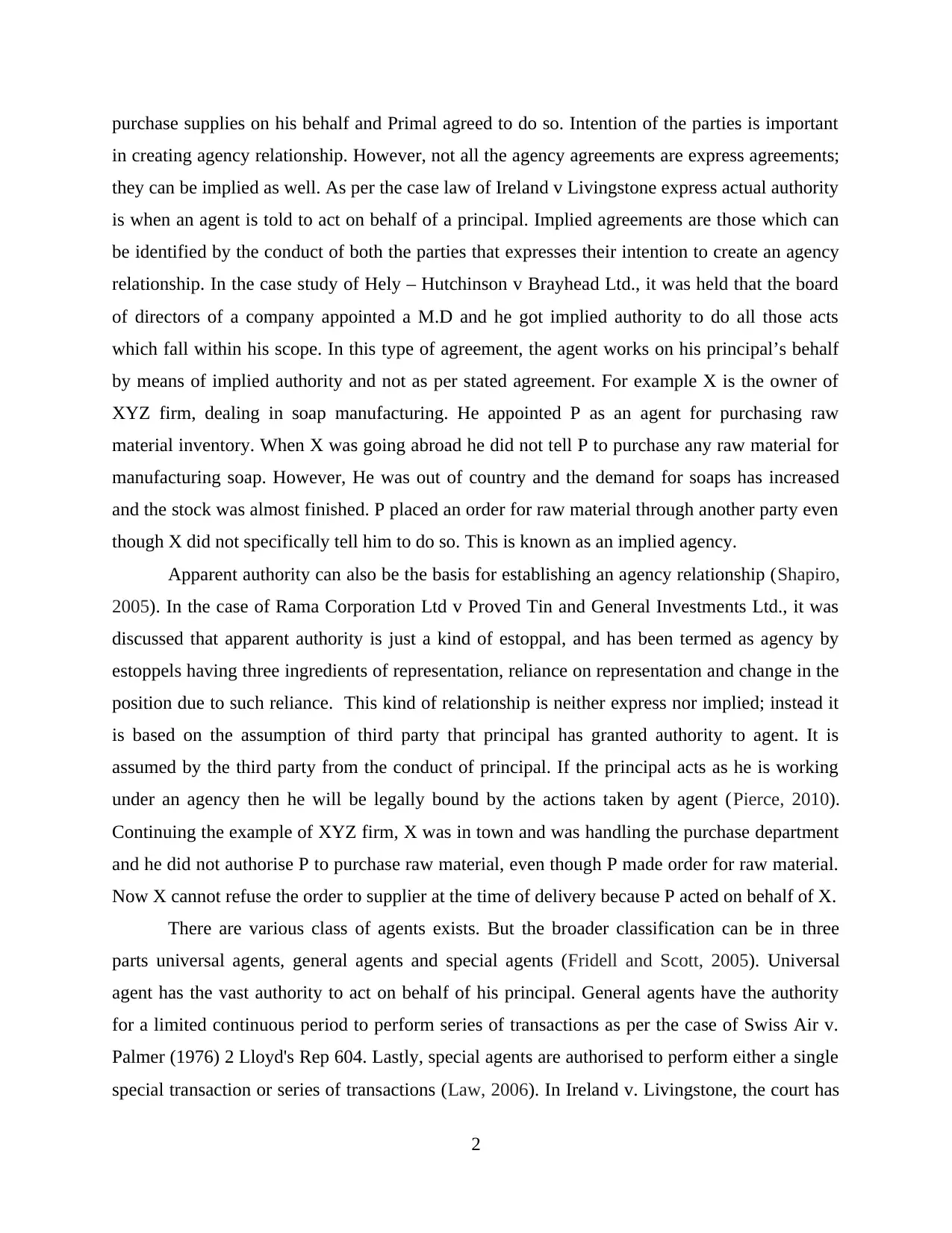
purchase supplies on his behalf and Primal agreed to do so. Intention of the parties is important
in creating agency relationship. However, not all the agency agreements are express agreements;
they can be implied as well. As per the case law of Ireland v Livingstone express actual authority
is when an agent is told to act on behalf of a principal. Implied agreements are those which can
be identified by the conduct of both the parties that expresses their intention to create an agency
relationship. In the case study of Hely – Hutchinson v Brayhead Ltd., it was held that the board
of directors of a company appointed a M.D and he got implied authority to do all those acts
which fall within his scope. In this type of agreement, the agent works on his principal’s behalf
by means of implied authority and not as per stated agreement. For example X is the owner of
XYZ firm, dealing in soap manufacturing. He appointed P as an agent for purchasing raw
material inventory. When X was going abroad he did not tell P to purchase any raw material for
manufacturing soap. However, He was out of country and the demand for soaps has increased
and the stock was almost finished. P placed an order for raw material through another party even
though X did not specifically tell him to do so. This is known as an implied agency.
Apparent authority can also be the basis for establishing an agency relationship (Shapiro,
2005). In the case of Rama Corporation Ltd v Proved Tin and General Investments Ltd., it was
discussed that apparent authority is just a kind of estoppal, and has been termed as agency by
estoppels having three ingredients of representation, reliance on representation and change in the
position due to such reliance. This kind of relationship is neither express nor implied; instead it
is based on the assumption of third party that principal has granted authority to agent. It is
assumed by the third party from the conduct of principal. If the principal acts as he is working
under an agency then he will be legally bound by the actions taken by agent (Pierce, 2010).
Continuing the example of XYZ firm, X was in town and was handling the purchase department
and he did not authorise P to purchase raw material, even though P made order for raw material.
Now X cannot refuse the order to supplier at the time of delivery because P acted on behalf of X.
There are various class of agents exists. But the broader classification can be in three
parts universal agents, general agents and special agents (Fridell and Scott, 2005). Universal
agent has the vast authority to act on behalf of his principal. General agents have the authority
for a limited continuous period to perform series of transactions as per the case of Swiss Air v.
Palmer (1976) 2 Lloyd's Rep 604. Lastly, special agents are authorised to perform either a single
special transaction or series of transactions (Law, 2006). In Ireland v. Livingstone, the court has
2
in creating agency relationship. However, not all the agency agreements are express agreements;
they can be implied as well. As per the case law of Ireland v Livingstone express actual authority
is when an agent is told to act on behalf of a principal. Implied agreements are those which can
be identified by the conduct of both the parties that expresses their intention to create an agency
relationship. In the case study of Hely – Hutchinson v Brayhead Ltd., it was held that the board
of directors of a company appointed a M.D and he got implied authority to do all those acts
which fall within his scope. In this type of agreement, the agent works on his principal’s behalf
by means of implied authority and not as per stated agreement. For example X is the owner of
XYZ firm, dealing in soap manufacturing. He appointed P as an agent for purchasing raw
material inventory. When X was going abroad he did not tell P to purchase any raw material for
manufacturing soap. However, He was out of country and the demand for soaps has increased
and the stock was almost finished. P placed an order for raw material through another party even
though X did not specifically tell him to do so. This is known as an implied agency.
Apparent authority can also be the basis for establishing an agency relationship (Shapiro,
2005). In the case of Rama Corporation Ltd v Proved Tin and General Investments Ltd., it was
discussed that apparent authority is just a kind of estoppal, and has been termed as agency by
estoppels having three ingredients of representation, reliance on representation and change in the
position due to such reliance. This kind of relationship is neither express nor implied; instead it
is based on the assumption of third party that principal has granted authority to agent. It is
assumed by the third party from the conduct of principal. If the principal acts as he is working
under an agency then he will be legally bound by the actions taken by agent (Pierce, 2010).
Continuing the example of XYZ firm, X was in town and was handling the purchase department
and he did not authorise P to purchase raw material, even though P made order for raw material.
Now X cannot refuse the order to supplier at the time of delivery because P acted on behalf of X.
There are various class of agents exists. But the broader classification can be in three
parts universal agents, general agents and special agents (Fridell and Scott, 2005). Universal
agent has the vast authority to act on behalf of his principal. General agents have the authority
for a limited continuous period to perform series of transactions as per the case of Swiss Air v.
Palmer (1976) 2 Lloyd's Rep 604. Lastly, special agents are authorised to perform either a single
special transaction or series of transactions (Law, 2006). In Ireland v. Livingstone, the court has
2
⊘ This is a preview!⊘
Do you want full access?
Subscribe today to unlock all pages.

Trusted by 1+ million students worldwide
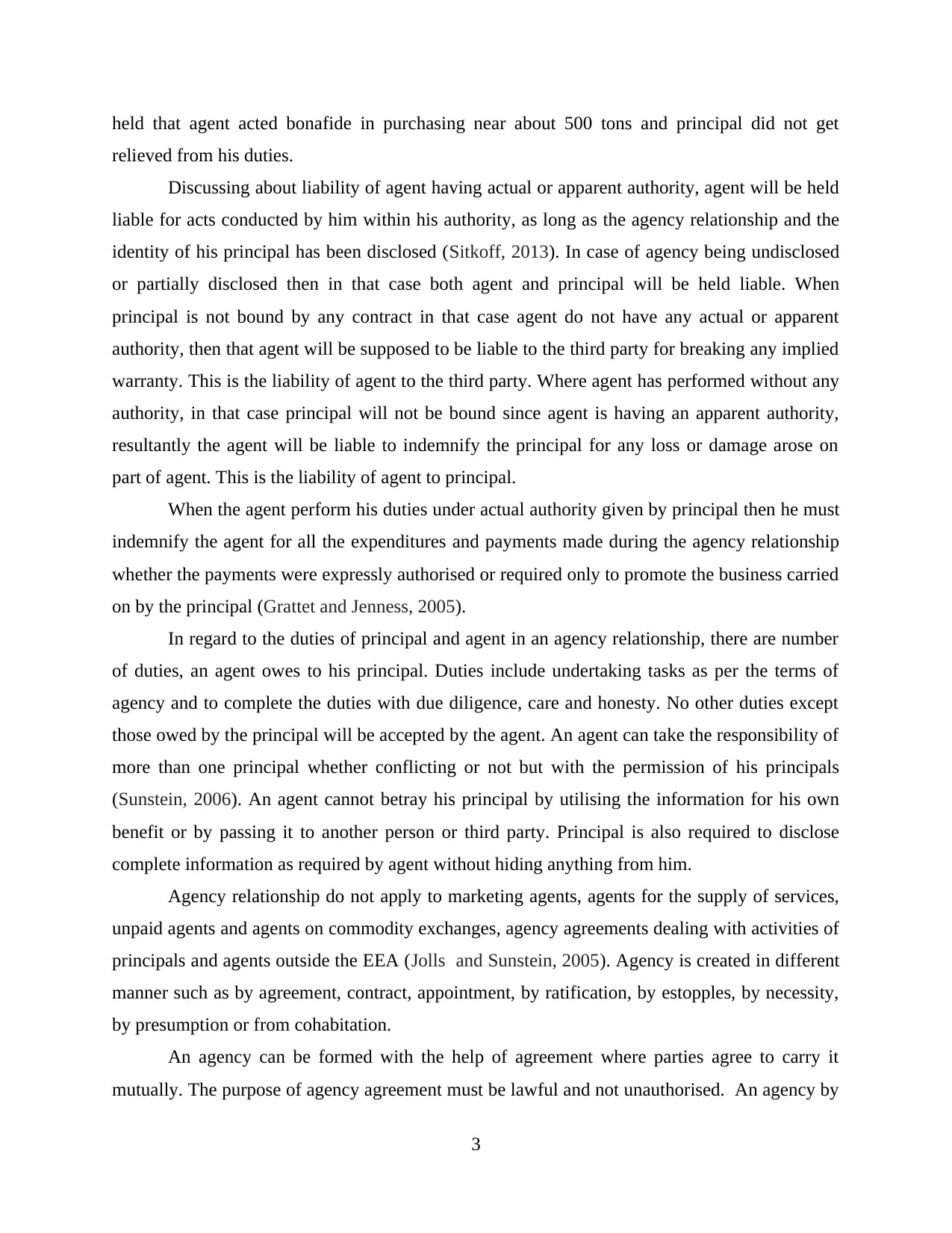
held that agent acted bonafide in purchasing near about 500 tons and principal did not get
relieved from his duties.
Discussing about liability of agent having actual or apparent authority, agent will be held
liable for acts conducted by him within his authority, as long as the agency relationship and the
identity of his principal has been disclosed (Sitkoff, 2013). In case of agency being undisclosed
or partially disclosed then in that case both agent and principal will be held liable. When
principal is not bound by any contract in that case agent do not have any actual or apparent
authority, then that agent will be supposed to be liable to the third party for breaking any implied
warranty. This is the liability of agent to the third party. Where agent has performed without any
authority, in that case principal will not be bound since agent is having an apparent authority,
resultantly the agent will be liable to indemnify the principal for any loss or damage arose on
part of agent. This is the liability of agent to principal.
When the agent perform his duties under actual authority given by principal then he must
indemnify the agent for all the expenditures and payments made during the agency relationship
whether the payments were expressly authorised or required only to promote the business carried
on by the principal (Grattet and Jenness, 2005).
In regard to the duties of principal and agent in an agency relationship, there are number
of duties, an agent owes to his principal. Duties include undertaking tasks as per the terms of
agency and to complete the duties with due diligence, care and honesty. No other duties except
those owed by the principal will be accepted by the agent. An agent can take the responsibility of
more than one principal whether conflicting or not but with the permission of his principals
(Sunstein, 2006). An agent cannot betray his principal by utilising the information for his own
benefit or by passing it to another person or third party. Principal is also required to disclose
complete information as required by agent without hiding anything from him.
Agency relationship do not apply to marketing agents, agents for the supply of services,
unpaid agents and agents on commodity exchanges, agency agreements dealing with activities of
principals and agents outside the EEA (Jolls and Sunstein, 2005). Agency is created in different
manner such as by agreement, contract, appointment, by ratification, by estopples, by necessity,
by presumption or from cohabitation.
An agency can be formed with the help of agreement where parties agree to carry it
mutually. The purpose of agency agreement must be lawful and not unauthorised. An agency by
3
relieved from his duties.
Discussing about liability of agent having actual or apparent authority, agent will be held
liable for acts conducted by him within his authority, as long as the agency relationship and the
identity of his principal has been disclosed (Sitkoff, 2013). In case of agency being undisclosed
or partially disclosed then in that case both agent and principal will be held liable. When
principal is not bound by any contract in that case agent do not have any actual or apparent
authority, then that agent will be supposed to be liable to the third party for breaking any implied
warranty. This is the liability of agent to the third party. Where agent has performed without any
authority, in that case principal will not be bound since agent is having an apparent authority,
resultantly the agent will be liable to indemnify the principal for any loss or damage arose on
part of agent. This is the liability of agent to principal.
When the agent perform his duties under actual authority given by principal then he must
indemnify the agent for all the expenditures and payments made during the agency relationship
whether the payments were expressly authorised or required only to promote the business carried
on by the principal (Grattet and Jenness, 2005).
In regard to the duties of principal and agent in an agency relationship, there are number
of duties, an agent owes to his principal. Duties include undertaking tasks as per the terms of
agency and to complete the duties with due diligence, care and honesty. No other duties except
those owed by the principal will be accepted by the agent. An agent can take the responsibility of
more than one principal whether conflicting or not but with the permission of his principals
(Sunstein, 2006). An agent cannot betray his principal by utilising the information for his own
benefit or by passing it to another person or third party. Principal is also required to disclose
complete information as required by agent without hiding anything from him.
Agency relationship do not apply to marketing agents, agents for the supply of services,
unpaid agents and agents on commodity exchanges, agency agreements dealing with activities of
principals and agents outside the EEA (Jolls and Sunstein, 2005). Agency is created in different
manner such as by agreement, contract, appointment, by ratification, by estopples, by necessity,
by presumption or from cohabitation.
An agency can be formed with the help of agreement where parties agree to carry it
mutually. The purpose of agency agreement must be lawful and not unauthorised. An agency by
3
Paraphrase This Document
Need a fresh take? Get an instant paraphrase of this document with our AI Paraphraser
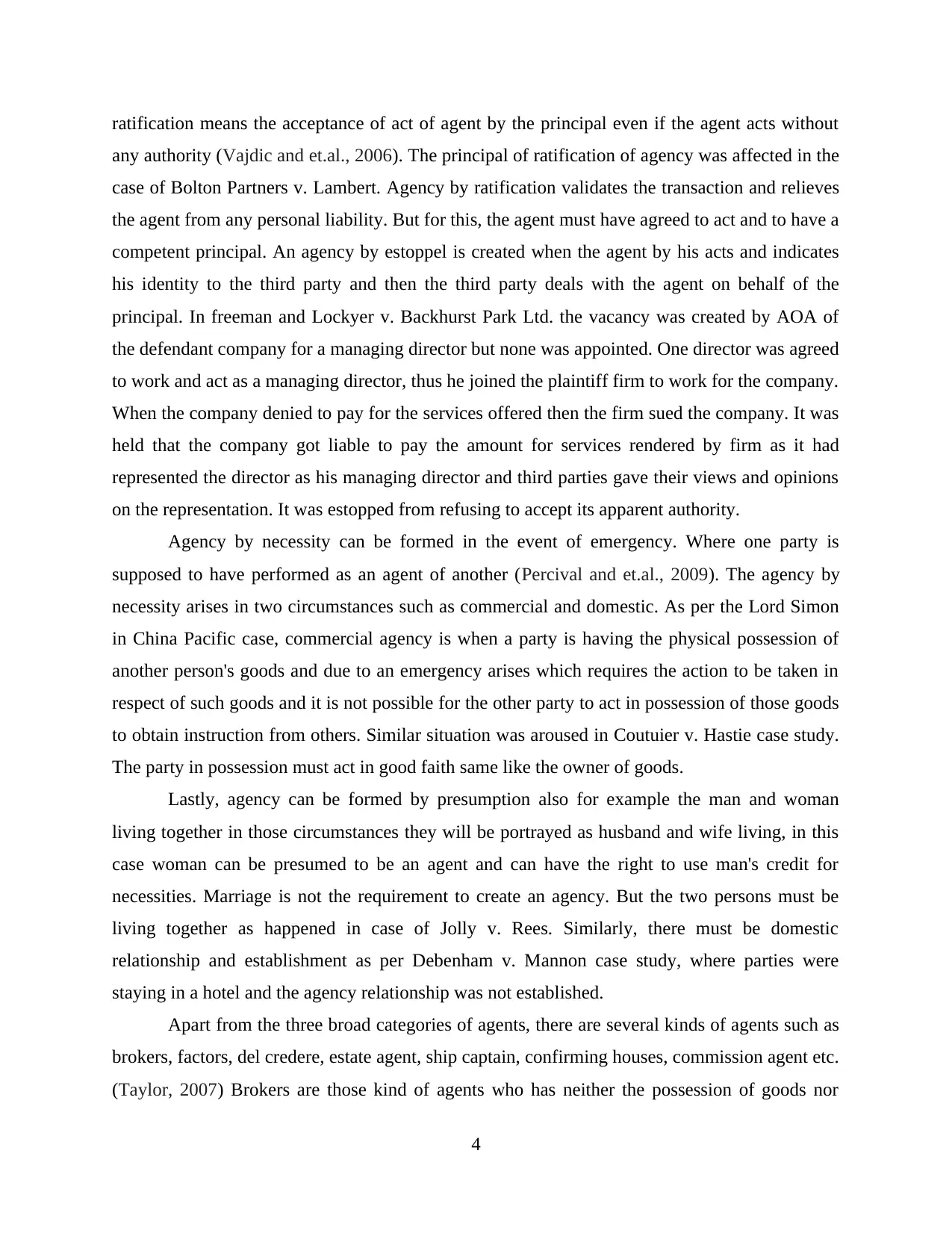
ratification means the acceptance of act of agent by the principal even if the agent acts without
any authority (Vajdic and et.al., 2006). The principal of ratification of agency was affected in the
case of Bolton Partners v. Lambert. Agency by ratification validates the transaction and relieves
the agent from any personal liability. But for this, the agent must have agreed to act and to have a
competent principal. An agency by estoppel is created when the agent by his acts and indicates
his identity to the third party and then the third party deals with the agent on behalf of the
principal. In freeman and Lockyer v. Backhurst Park Ltd. the vacancy was created by AOA of
the defendant company for a managing director but none was appointed. One director was agreed
to work and act as a managing director, thus he joined the plaintiff firm to work for the company.
When the company denied to pay for the services offered then the firm sued the company. It was
held that the company got liable to pay the amount for services rendered by firm as it had
represented the director as his managing director and third parties gave their views and opinions
on the representation. It was estopped from refusing to accept its apparent authority.
Agency by necessity can be formed in the event of emergency. Where one party is
supposed to have performed as an agent of another (Percival and et.al., 2009). The agency by
necessity arises in two circumstances such as commercial and domestic. As per the Lord Simon
in China Pacific case, commercial agency is when a party is having the physical possession of
another person's goods and due to an emergency arises which requires the action to be taken in
respect of such goods and it is not possible for the other party to act in possession of those goods
to obtain instruction from others. Similar situation was aroused in Coutuier v. Hastie case study.
The party in possession must act in good faith same like the owner of goods.
Lastly, agency can be formed by presumption also for example the man and woman
living together in those circumstances they will be portrayed as husband and wife living, in this
case woman can be presumed to be an agent and can have the right to use man's credit for
necessities. Marriage is not the requirement to create an agency. But the two persons must be
living together as happened in case of Jolly v. Rees. Similarly, there must be domestic
relationship and establishment as per Debenham v. Mannon case study, where parties were
staying in a hotel and the agency relationship was not established.
Apart from the three broad categories of agents, there are several kinds of agents such as
brokers, factors, del credere, estate agent, ship captain, confirming houses, commission agent etc.
(Taylor, 2007) Brokers are those kind of agents who has neither the possession of goods nor
4
any authority (Vajdic and et.al., 2006). The principal of ratification of agency was affected in the
case of Bolton Partners v. Lambert. Agency by ratification validates the transaction and relieves
the agent from any personal liability. But for this, the agent must have agreed to act and to have a
competent principal. An agency by estoppel is created when the agent by his acts and indicates
his identity to the third party and then the third party deals with the agent on behalf of the
principal. In freeman and Lockyer v. Backhurst Park Ltd. the vacancy was created by AOA of
the defendant company for a managing director but none was appointed. One director was agreed
to work and act as a managing director, thus he joined the plaintiff firm to work for the company.
When the company denied to pay for the services offered then the firm sued the company. It was
held that the company got liable to pay the amount for services rendered by firm as it had
represented the director as his managing director and third parties gave their views and opinions
on the representation. It was estopped from refusing to accept its apparent authority.
Agency by necessity can be formed in the event of emergency. Where one party is
supposed to have performed as an agent of another (Percival and et.al., 2009). The agency by
necessity arises in two circumstances such as commercial and domestic. As per the Lord Simon
in China Pacific case, commercial agency is when a party is having the physical possession of
another person's goods and due to an emergency arises which requires the action to be taken in
respect of such goods and it is not possible for the other party to act in possession of those goods
to obtain instruction from others. Similar situation was aroused in Coutuier v. Hastie case study.
The party in possession must act in good faith same like the owner of goods.
Lastly, agency can be formed by presumption also for example the man and woman
living together in those circumstances they will be portrayed as husband and wife living, in this
case woman can be presumed to be an agent and can have the right to use man's credit for
necessities. Marriage is not the requirement to create an agency. But the two persons must be
living together as happened in case of Jolly v. Rees. Similarly, there must be domestic
relationship and establishment as per Debenham v. Mannon case study, where parties were
staying in a hotel and the agency relationship was not established.
Apart from the three broad categories of agents, there are several kinds of agents such as
brokers, factors, del credere, estate agent, ship captain, confirming houses, commission agent etc.
(Taylor, 2007) Brokers are those kind of agents who has neither the possession of goods nor
4
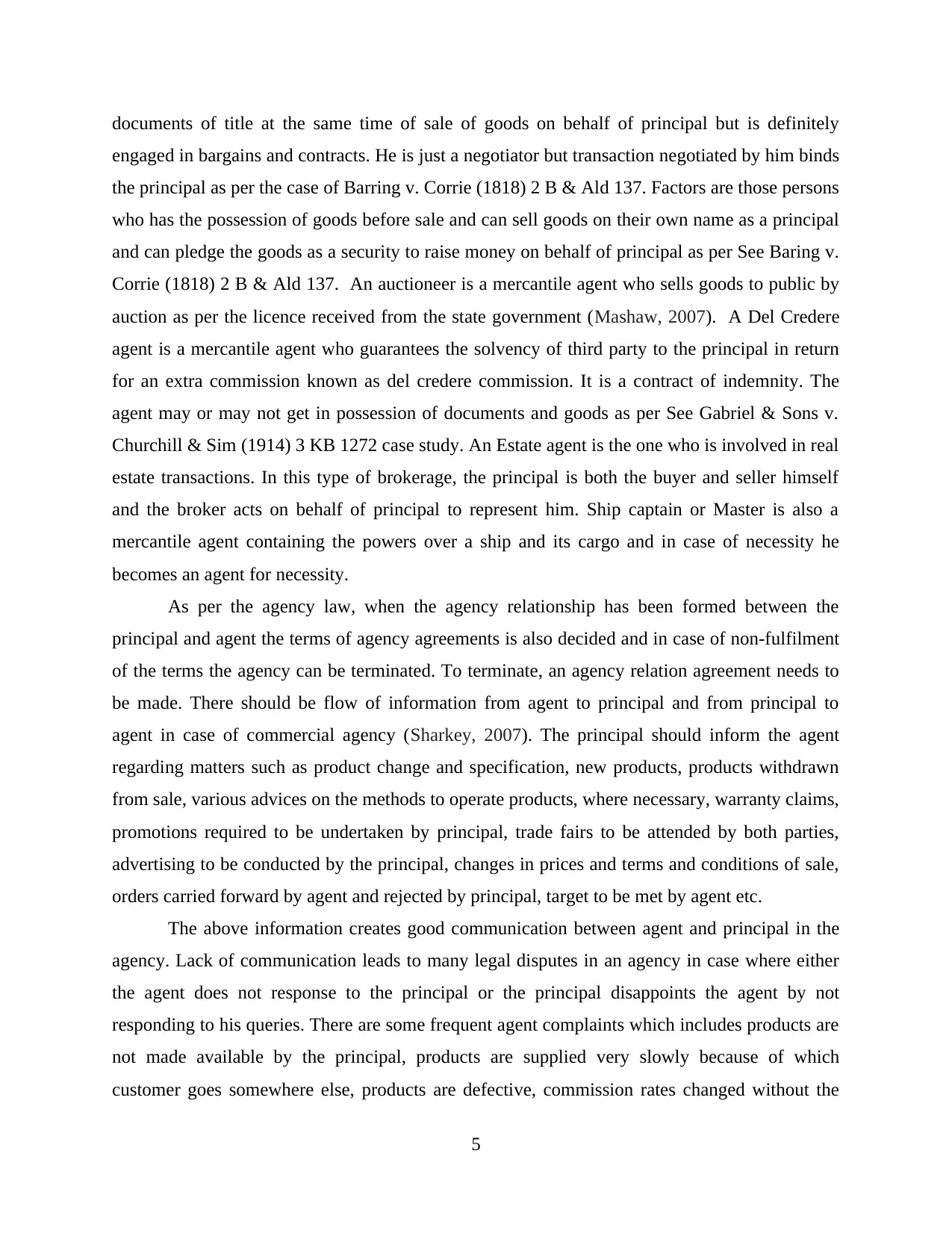
documents of title at the same time of sale of goods on behalf of principal but is definitely
engaged in bargains and contracts. He is just a negotiator but transaction negotiated by him binds
the principal as per the case of Barring v. Corrie (1818) 2 B & Ald 137. Factors are those persons
who has the possession of goods before sale and can sell goods on their own name as a principal
and can pledge the goods as a security to raise money on behalf of principal as per See Baring v.
Corrie (1818) 2 B & Ald 137. An auctioneer is a mercantile agent who sells goods to public by
auction as per the licence received from the state government (Mashaw, 2007). A Del Credere
agent is a mercantile agent who guarantees the solvency of third party to the principal in return
for an extra commission known as del credere commission. It is a contract of indemnity. The
agent may or may not get in possession of documents and goods as per See Gabriel & Sons v.
Churchill & Sim (1914) 3 KB 1272 case study. An Estate agent is the one who is involved in real
estate transactions. In this type of brokerage, the principal is both the buyer and seller himself
and the broker acts on behalf of principal to represent him. Ship captain or Master is also a
mercantile agent containing the powers over a ship and its cargo and in case of necessity he
becomes an agent for necessity.
As per the agency law, when the agency relationship has been formed between the
principal and agent the terms of agency agreements is also decided and in case of non-fulfilment
of the terms the agency can be terminated. To terminate, an agency relation agreement needs to
be made. There should be flow of information from agent to principal and from principal to
agent in case of commercial agency (Sharkey, 2007). The principal should inform the agent
regarding matters such as product change and specification, new products, products withdrawn
from sale, various advices on the methods to operate products, where necessary, warranty claims,
promotions required to be undertaken by principal, trade fairs to be attended by both parties,
advertising to be conducted by the principal, changes in prices and terms and conditions of sale,
orders carried forward by agent and rejected by principal, target to be met by agent etc.
The above information creates good communication between agent and principal in the
agency. Lack of communication leads to many legal disputes in an agency in case where either
the agent does not response to the principal or the principal disappoints the agent by not
responding to his queries. There are some frequent agent complaints which includes products are
not made available by the principal, products are supplied very slowly because of which
customer goes somewhere else, products are defective, commission rates changed without the
5
engaged in bargains and contracts. He is just a negotiator but transaction negotiated by him binds
the principal as per the case of Barring v. Corrie (1818) 2 B & Ald 137. Factors are those persons
who has the possession of goods before sale and can sell goods on their own name as a principal
and can pledge the goods as a security to raise money on behalf of principal as per See Baring v.
Corrie (1818) 2 B & Ald 137. An auctioneer is a mercantile agent who sells goods to public by
auction as per the licence received from the state government (Mashaw, 2007). A Del Credere
agent is a mercantile agent who guarantees the solvency of third party to the principal in return
for an extra commission known as del credere commission. It is a contract of indemnity. The
agent may or may not get in possession of documents and goods as per See Gabriel & Sons v.
Churchill & Sim (1914) 3 KB 1272 case study. An Estate agent is the one who is involved in real
estate transactions. In this type of brokerage, the principal is both the buyer and seller himself
and the broker acts on behalf of principal to represent him. Ship captain or Master is also a
mercantile agent containing the powers over a ship and its cargo and in case of necessity he
becomes an agent for necessity.
As per the agency law, when the agency relationship has been formed between the
principal and agent the terms of agency agreements is also decided and in case of non-fulfilment
of the terms the agency can be terminated. To terminate, an agency relation agreement needs to
be made. There should be flow of information from agent to principal and from principal to
agent in case of commercial agency (Sharkey, 2007). The principal should inform the agent
regarding matters such as product change and specification, new products, products withdrawn
from sale, various advices on the methods to operate products, where necessary, warranty claims,
promotions required to be undertaken by principal, trade fairs to be attended by both parties,
advertising to be conducted by the principal, changes in prices and terms and conditions of sale,
orders carried forward by agent and rejected by principal, target to be met by agent etc.
The above information creates good communication between agent and principal in the
agency. Lack of communication leads to many legal disputes in an agency in case where either
the agent does not response to the principal or the principal disappoints the agent by not
responding to his queries. There are some frequent agent complaints which includes products are
not made available by the principal, products are supplied very slowly because of which
customer goes somewhere else, products are defective, commission rates changed without the
5
⊘ This is a preview!⊘
Do you want full access?
Subscribe today to unlock all pages.

Trusted by 1+ million students worldwide
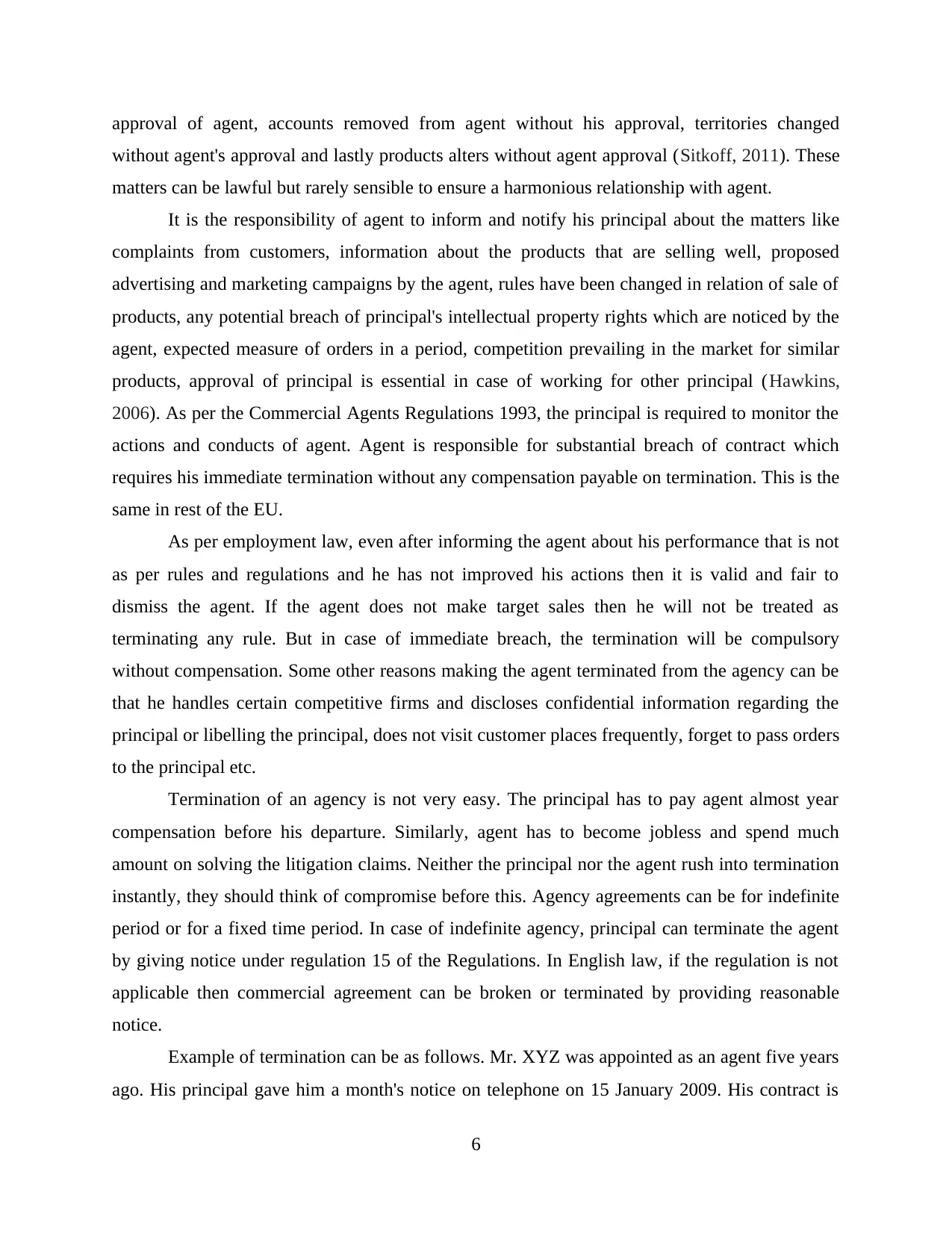
approval of agent, accounts removed from agent without his approval, territories changed
without agent's approval and lastly products alters without agent approval (Sitkoff, 2011). These
matters can be lawful but rarely sensible to ensure a harmonious relationship with agent.
It is the responsibility of agent to inform and notify his principal about the matters like
complaints from customers, information about the products that are selling well, proposed
advertising and marketing campaigns by the agent, rules have been changed in relation of sale of
products, any potential breach of principal's intellectual property rights which are noticed by the
agent, expected measure of orders in a period, competition prevailing in the market for similar
products, approval of principal is essential in case of working for other principal (Hawkins,
2006). As per the Commercial Agents Regulations 1993, the principal is required to monitor the
actions and conducts of agent. Agent is responsible for substantial breach of contract which
requires his immediate termination without any compensation payable on termination. This is the
same in rest of the EU.
As per employment law, even after informing the agent about his performance that is not
as per rules and regulations and he has not improved his actions then it is valid and fair to
dismiss the agent. If the agent does not make target sales then he will not be treated as
terminating any rule. But in case of immediate breach, the termination will be compulsory
without compensation. Some other reasons making the agent terminated from the agency can be
that he handles certain competitive firms and discloses confidential information regarding the
principal or libelling the principal, does not visit customer places frequently, forget to pass orders
to the principal etc.
Termination of an agency is not very easy. The principal has to pay agent almost year
compensation before his departure. Similarly, agent has to become jobless and spend much
amount on solving the litigation claims. Neither the principal nor the agent rush into termination
instantly, they should think of compromise before this. Agency agreements can be for indefinite
period or for a fixed time period. In case of indefinite agency, principal can terminate the agent
by giving notice under regulation 15 of the Regulations. In English law, if the regulation is not
applicable then commercial agreement can be broken or terminated by providing reasonable
notice.
Example of termination can be as follows. Mr. XYZ was appointed as an agent five years
ago. His principal gave him a month's notice on telephone on 15 January 2009. His contract is
6
without agent's approval and lastly products alters without agent approval (Sitkoff, 2011). These
matters can be lawful but rarely sensible to ensure a harmonious relationship with agent.
It is the responsibility of agent to inform and notify his principal about the matters like
complaints from customers, information about the products that are selling well, proposed
advertising and marketing campaigns by the agent, rules have been changed in relation of sale of
products, any potential breach of principal's intellectual property rights which are noticed by the
agent, expected measure of orders in a period, competition prevailing in the market for similar
products, approval of principal is essential in case of working for other principal (Hawkins,
2006). As per the Commercial Agents Regulations 1993, the principal is required to monitor the
actions and conducts of agent. Agent is responsible for substantial breach of contract which
requires his immediate termination without any compensation payable on termination. This is the
same in rest of the EU.
As per employment law, even after informing the agent about his performance that is not
as per rules and regulations and he has not improved his actions then it is valid and fair to
dismiss the agent. If the agent does not make target sales then he will not be treated as
terminating any rule. But in case of immediate breach, the termination will be compulsory
without compensation. Some other reasons making the agent terminated from the agency can be
that he handles certain competitive firms and discloses confidential information regarding the
principal or libelling the principal, does not visit customer places frequently, forget to pass orders
to the principal etc.
Termination of an agency is not very easy. The principal has to pay agent almost year
compensation before his departure. Similarly, agent has to become jobless and spend much
amount on solving the litigation claims. Neither the principal nor the agent rush into termination
instantly, they should think of compromise before this. Agency agreements can be for indefinite
period or for a fixed time period. In case of indefinite agency, principal can terminate the agent
by giving notice under regulation 15 of the Regulations. In English law, if the regulation is not
applicable then commercial agreement can be broken or terminated by providing reasonable
notice.
Example of termination can be as follows. Mr. XYZ was appointed as an agent five years
ago. His principal gave him a month's notice on telephone on 15 January 2009. His contract is
6
Paraphrase This Document
Need a fresh take? Get an instant paraphrase of this document with our AI Paraphraser
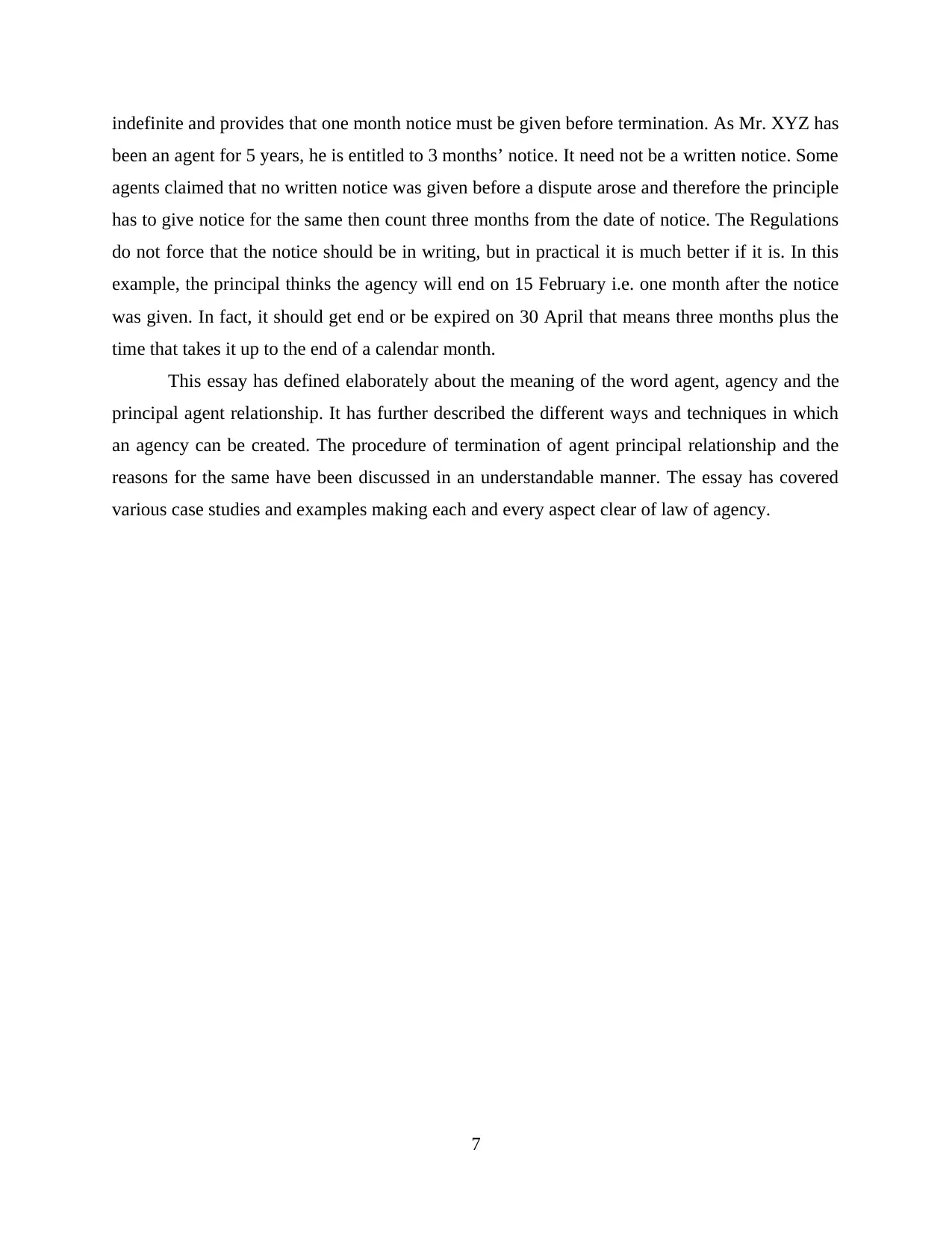
indefinite and provides that one month notice must be given before termination. As Mr. XYZ has
been an agent for 5 years, he is entitled to 3 months’ notice. It need not be a written notice. Some
agents claimed that no written notice was given before a dispute arose and therefore the principle
has to give notice for the same then count three months from the date of notice. The Regulations
do not force that the notice should be in writing, but in practical it is much better if it is. In this
example, the principal thinks the agency will end on 15 February i.e. one month after the notice
was given. In fact, it should get end or be expired on 30 April that means three months plus the
time that takes it up to the end of a calendar month.
This essay has defined elaborately about the meaning of the word agent, agency and the
principal agent relationship. It has further described the different ways and techniques in which
an agency can be created. The procedure of termination of agent principal relationship and the
reasons for the same have been discussed in an understandable manner. The essay has covered
various case studies and examples making each and every aspect clear of law of agency.
7
been an agent for 5 years, he is entitled to 3 months’ notice. It need not be a written notice. Some
agents claimed that no written notice was given before a dispute arose and therefore the principle
has to give notice for the same then count three months from the date of notice. The Regulations
do not force that the notice should be in writing, but in practical it is much better if it is. In this
example, the principal thinks the agency will end on 15 February i.e. one month after the notice
was given. In fact, it should get end or be expired on 30 April that means three months plus the
time that takes it up to the end of a calendar month.
This essay has defined elaborately about the meaning of the word agent, agency and the
principal agent relationship. It has further described the different ways and techniques in which
an agency can be created. The procedure of termination of agent principal relationship and the
reasons for the same have been discussed in an understandable manner. The essay has covered
various case studies and examples making each and every aspect clear of law of agency.
7
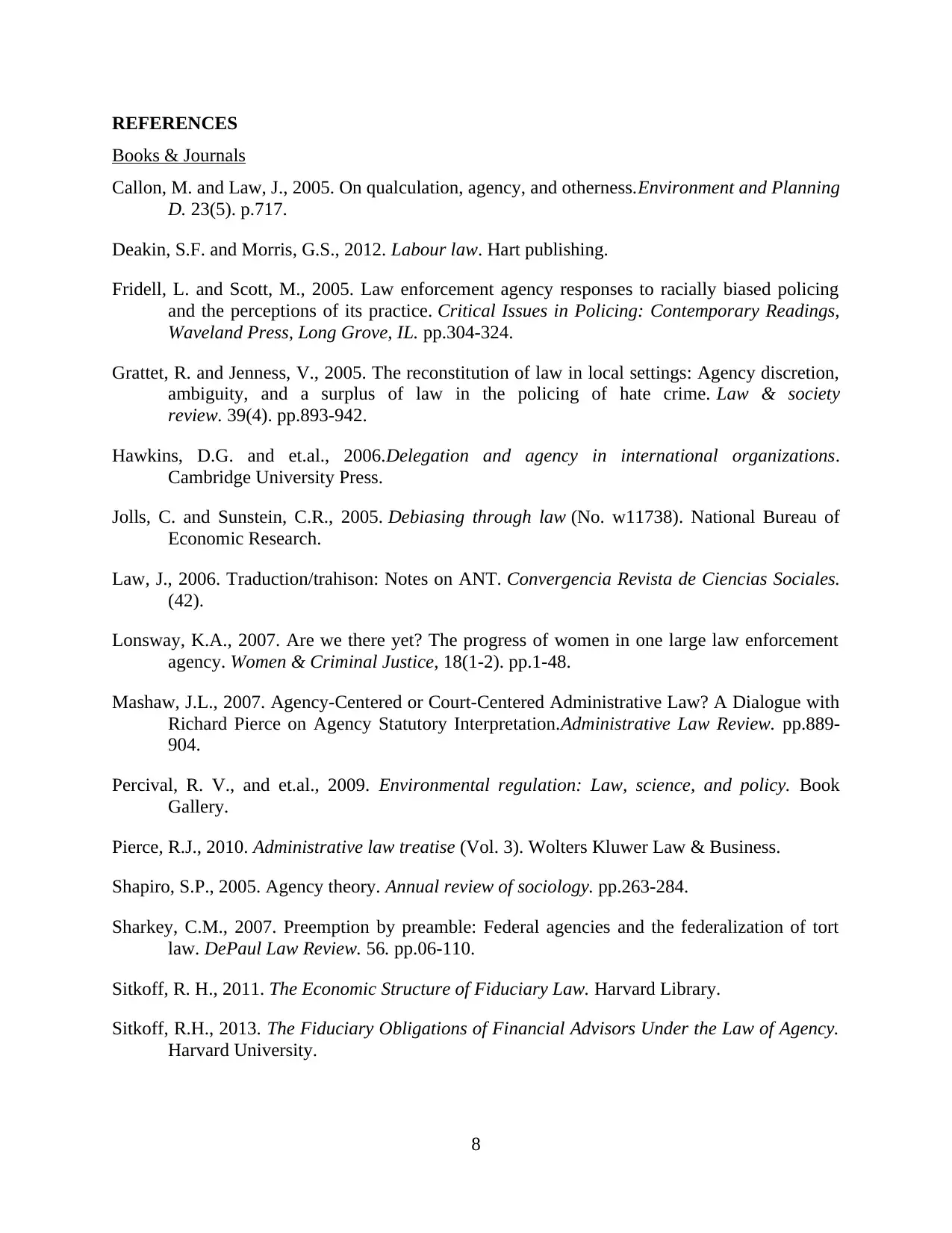
REFERENCES
Books & Journals
Callon, M. and Law, J., 2005. On qualculation, agency, and otherness.Environment and Planning
D. 23(5). p.717.
Deakin, S.F. and Morris, G.S., 2012. Labour law. Hart publishing.
Fridell, L. and Scott, M., 2005. Law enforcement agency responses to racially biased policing
and the perceptions of its practice. Critical Issues in Policing: Contemporary Readings,
Waveland Press, Long Grove, IL. pp.304-324.
Grattet, R. and Jenness, V., 2005. The reconstitution of law in local settings: Agency discretion,
ambiguity, and a surplus of law in the policing of hate crime. Law & society
review. 39(4). pp.893-942.
Hawkins, D.G. and et.al., 2006.Delegation and agency in international organizations.
Cambridge University Press.
Jolls, C. and Sunstein, C.R., 2005. Debiasing through law (No. w11738). National Bureau of
Economic Research.
Law, J., 2006. Traduction/trahison: Notes on ANT. Convergencia Revista de Ciencias Sociales.
(42).
Lonsway, K.A., 2007. Are we there yet? The progress of women in one large law enforcement
agency. Women & Criminal Justice, 18(1-2). pp.1-48.
Mashaw, J.L., 2007. Agency-Centered or Court-Centered Administrative Law? A Dialogue with
Richard Pierce on Agency Statutory Interpretation.Administrative Law Review. pp.889-
904.
Percival, R. V., and et.al., 2009. Environmental regulation: Law, science, and policy. Book
Gallery.
Pierce, R.J., 2010. Administrative law treatise (Vol. 3). Wolters Kluwer Law & Business.
Shapiro, S.P., 2005. Agency theory. Annual review of sociology. pp.263-284.
Sharkey, C.M., 2007. Preemption by preamble: Federal agencies and the federalization of tort
law. DePaul Law Review. 56. pp.06-110.
Sitkoff, R. H., 2011. The Economic Structure of Fiduciary Law. Harvard Library.
Sitkoff, R.H., 2013. The Fiduciary Obligations of Financial Advisors Under the Law of Agency.
Harvard University.
8
Books & Journals
Callon, M. and Law, J., 2005. On qualculation, agency, and otherness.Environment and Planning
D. 23(5). p.717.
Deakin, S.F. and Morris, G.S., 2012. Labour law. Hart publishing.
Fridell, L. and Scott, M., 2005. Law enforcement agency responses to racially biased policing
and the perceptions of its practice. Critical Issues in Policing: Contemporary Readings,
Waveland Press, Long Grove, IL. pp.304-324.
Grattet, R. and Jenness, V., 2005. The reconstitution of law in local settings: Agency discretion,
ambiguity, and a surplus of law in the policing of hate crime. Law & society
review. 39(4). pp.893-942.
Hawkins, D.G. and et.al., 2006.Delegation and agency in international organizations.
Cambridge University Press.
Jolls, C. and Sunstein, C.R., 2005. Debiasing through law (No. w11738). National Bureau of
Economic Research.
Law, J., 2006. Traduction/trahison: Notes on ANT. Convergencia Revista de Ciencias Sociales.
(42).
Lonsway, K.A., 2007. Are we there yet? The progress of women in one large law enforcement
agency. Women & Criminal Justice, 18(1-2). pp.1-48.
Mashaw, J.L., 2007. Agency-Centered or Court-Centered Administrative Law? A Dialogue with
Richard Pierce on Agency Statutory Interpretation.Administrative Law Review. pp.889-
904.
Percival, R. V., and et.al., 2009. Environmental regulation: Law, science, and policy. Book
Gallery.
Pierce, R.J., 2010. Administrative law treatise (Vol. 3). Wolters Kluwer Law & Business.
Shapiro, S.P., 2005. Agency theory. Annual review of sociology. pp.263-284.
Sharkey, C.M., 2007. Preemption by preamble: Federal agencies and the federalization of tort
law. DePaul Law Review. 56. pp.06-110.
Sitkoff, R. H., 2011. The Economic Structure of Fiduciary Law. Harvard Library.
Sitkoff, R.H., 2013. The Fiduciary Obligations of Financial Advisors Under the Law of Agency.
Harvard University.
8
⊘ This is a preview!⊘
Do you want full access?
Subscribe today to unlock all pages.

Trusted by 1+ million students worldwide
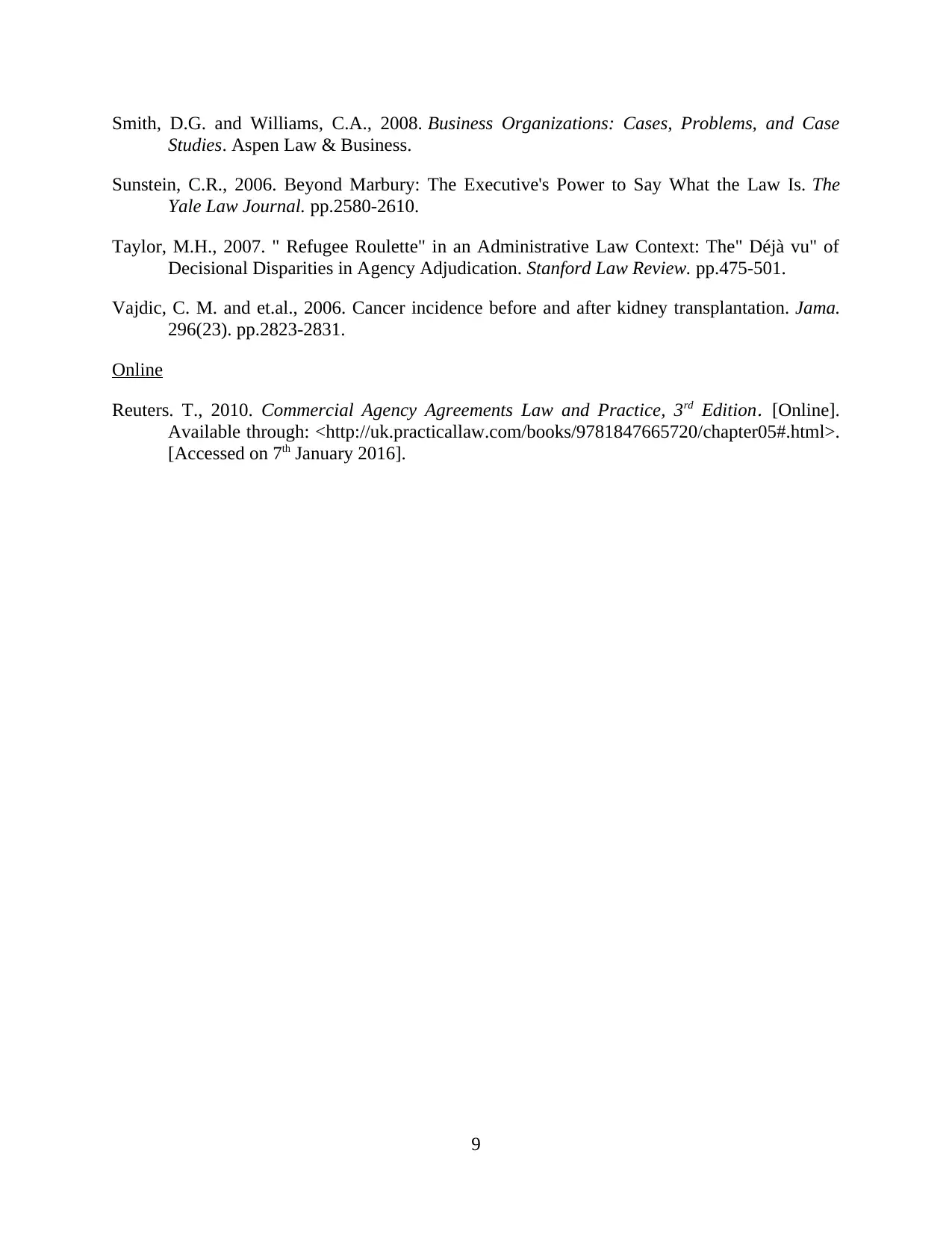
Smith, D.G. and Williams, C.A., 2008. Business Organizations: Cases, Problems, and Case
Studies. Aspen Law & Business.
Sunstein, C.R., 2006. Beyond Marbury: The Executive's Power to Say What the Law Is. The
Yale Law Journal. pp.2580-2610.
Taylor, M.H., 2007. " Refugee Roulette" in an Administrative Law Context: The" Déjà vu" of
Decisional Disparities in Agency Adjudication. Stanford Law Review. pp.475-501.
Vajdic, C. M. and et.al., 2006. Cancer incidence before and after kidney transplantation. Jama.
296(23). pp.2823-2831.
Online
Reuters. T., 2010. Commercial Agency Agreements Law and Practice, 3rd Edition. [Online].
Available through: <http://uk.practicallaw.com/books/9781847665720/chapter05#.html>.
[Accessed on 7th January 2016].
9
Studies. Aspen Law & Business.
Sunstein, C.R., 2006. Beyond Marbury: The Executive's Power to Say What the Law Is. The
Yale Law Journal. pp.2580-2610.
Taylor, M.H., 2007. " Refugee Roulette" in an Administrative Law Context: The" Déjà vu" of
Decisional Disparities in Agency Adjudication. Stanford Law Review. pp.475-501.
Vajdic, C. M. and et.al., 2006. Cancer incidence before and after kidney transplantation. Jama.
296(23). pp.2823-2831.
Online
Reuters. T., 2010. Commercial Agency Agreements Law and Practice, 3rd Edition. [Online].
Available through: <http://uk.practicallaw.com/books/9781847665720/chapter05#.html>.
[Accessed on 7th January 2016].
9
1 out of 10
Related Documents
Your All-in-One AI-Powered Toolkit for Academic Success.
+13062052269
info@desklib.com
Available 24*7 on WhatsApp / Email
![[object Object]](/_next/static/media/star-bottom.7253800d.svg)
Unlock your academic potential
Copyright © 2020–2026 A2Z Services. All Rights Reserved. Developed and managed by ZUCOL.





